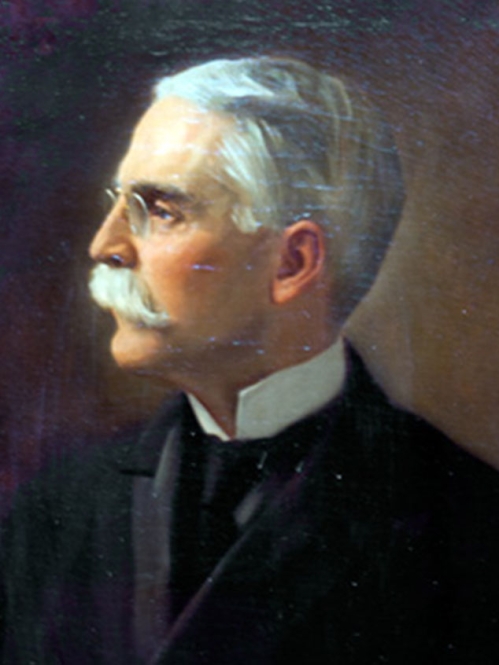Merrill Edward Gates
Rutgers' 9th President, 1882 to 1890

Summary
Merrill Edward Gates (1848–1922), the first professional educator to assume the presidency of Rutgers College, was 34 years old when he arrived in New Brunswick to succeed the Reverend William H. Campbell in 1882 as Rutgers’ ninth president. Born in Warsaw, New York, Gates was a graduate of the University of Rochester, where he achieved high honors in mathematics, Latin, and Greek, and received the English Essay Prize of the senior year. For 12 years he was principal of the Albany Academy, where he extended the course of study from eight to 12 years, covering much of a college course, and increased the total attendance of the school from 70 to 300 students. Traveling to England in 1872, he visited the educational institutions at Rugby and Oxford. In 1875 he was elected chancellor of the University of Tennessee, but declined the offer and remained in Albany. He went abroad again in 1879, spending a year of travel and study in France, Italy, Egypt, Palestine, and Greece. The University of the State of New York conferred on him an honorary degree in 1880, and in June 1882, both Princeton and the University of Rochester awarded him the degree of doctor of laws. Following his presidency at Rutgers, he received the L.L.D. degree from Columbia University in 1891 and from Williams College in 1893. Columbia University also conferred upon him the degree of L.H.D. in 1887.
Biography
An academic disciplinarian who sought tighter control over student discipline, President Gates was a firm believer in liberal education. He opposed the expansion of the elective system, which was popularized at the time by President Charles Eliot at Harvard, and introduced in a modified form in Rutgers during the Campbell administration. He shook up the faculty and brought to Rutgers young academic scholars. He also made the first nonfaculty appointments in the college. Although generally unsuccessful with acquiring substantial private support, he did accept the unsolicited offer by Garret E. Winants of Jersey City to build the college’s first dormitory, which was completed in 1890. Gates was effective in securing increased state and federal aid. In 1887, under the provisions of the Hatch Act, the agricultural experiment station was established with an annual subsidy of $15,000. Rutgers also obtained additional federal funds for the Scientific School with the passage of the second Morrill Act of 1890. Relations with the State of New Jersey also moved forward. The state erected New Jersey Hall in 1889 on land conveyed to them by the college for the State Agricultural Experiment Station. The building was also used by the college for chemistry and biology instruction. In 1890 the State Scholarship Act was passed by the legislature, which provided one scholarship in each of the 60 assembly districts in New Jersey. Since the scholarships were to be used for the state agricultural college, the scientific students at Rutgers soon outnumbered those pursuing a classical curriculum.
In 1890 Merrill Gates resigned the presidency of Rutgers to become the president of Amherst College. In 1899 he left Amherst and was named chair of the U.S. Board of Indian Commissioners, and later named secretary of the board, serving from 1889 to 1912. He remained in Washington, D.C., presenting lectures and serving literary and philanthropic societies, and preaching in the Congregational Church. He died at his summer home in Bethlehem, New Hampshire, on August 11, 1922, at the age of 74.